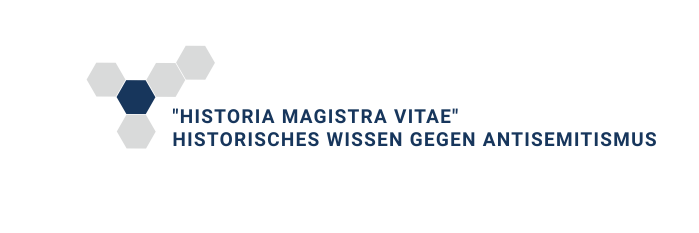
Anti-Semitism is a widespread phenomenon in schools and in public. Teachers and police officers are the professions whose original task is to intervene in cases of anti-Semitism. Through the new legal regulation of Paragraph 46, II StGB1 , the German Bundestag has expanded the circumstances to be considered in sentencing to include "anti-Semitic" motives and goals of the perpetrator. In order to be able to identify motives and goals as anti-Semitic in this sense, it is necessary to professionalize future civil servants in this regard and to integrate anti-Semitism-related action knowledge into their curricular training. This would also provide those affected by anti-Semitism with the empathy from the state and society that they currently often lack.
This is where our innovative project comes in with an ambitious approach to the interdisciplinary development of a "Joint Empowerment". The project consists of the development, implementation, and evaluation of
The goal of the parallel development of a valid test instrument and the intervention is to have a test available at the end of the project that can also be used in affinity areas in the context of anti-Semitism prevention, which can also be used in combination with validated course materials on KAP in multiple education and training contexts in schools and the police and beyond (e.g., the judiciary, the armed forces, the Office for the Protection of the Constitution, the Foreign Service). Such possibilities are already being explored and conceptually implemented with the members of the advisory board during the project. The test's representativeness beyond NRW for the Federal Republic of Germany will also be explored and aimed at. How is the test to be used? The KAP core curriculum and the basic principles of intervention are to be implemented in training and further education programs through cooperation with practical partners from teacher and police training. The standardized KAP test and the qualitative interview guidelines will serve as evaluation instruments as well as independently for the assessment of knowledge and attitudes.

At the Bochum site, the entire collaborative project is coordinated under the direction of Prof. Dr. Nicola Brauch (RD CERES).
At the Bochum sub-project "Historia Magistra Vitae. Historical Knowledge against Anti-Semitism (HiMAVi)" both the History Didactics, around the project leader Prof. Dr. Nicola Brauch, and the Center for Religious Studies (CERES) with the professorship for Judaism in History and the Present with Prof. Dr. Alexandra Cuffel are involved. The sub-project comprises the development of a scientific and didactic contribution to the development, implementation and evaluation of a course program for prospective teachers and police officers on the prevention of anti-Semitism on the basis of the KAP.
The scientific part consists of the development of historical content for the four educational modules of the intervention. The goal is to provide sound basic knowledge that makes it possible to deconstruct anti-Semitic narratives historically and to convey positive knowledge about Judaism. The didactic part consists of the didactic-methodical design of the intervention as well as its implementation and evaluation especially for the target group of teachers in consultation with police training. Based on this, it will be examined in more detail to what extent the intervention promotes historical relevance convictions on the basis of the topic of anti-Semitism and how these are related to knowledge acquisition, attitudes and argumentation skills on the topic.
The team develops, implements and evaluates a core curriculum for the training of future police officers and teachers in order to prevent and repressive anti-Semitism. As part of a psychometrically secured digital large-scale test, the target groups' attitudes and knowledge about anti-Semitism and Jewish life are first recorded. This allows the curriculum to be better tailored. In addition, police and teachers learn how to intervene appropriately when dealing with anti-Semitism.
Institutions: Ruhr-University Bochum, Historical Institute & Centre for Religious Studies
Project management:
Participants:
Associates:
Funding period: 10.2021 - 09.2025
Funded by:

The Research Network on Antisemitism in the 21st Century (FoNA21) was founded within the framework of the Federal Ministry of Education and Research (BMBF) funding program Current Dynamics and Challenges of Antisemitism. It is composed of ten collaborative projects and one coordinating project that are dedicated to researching the causes and manifestations of antisemitism in contemporary Germany through a variety of interdisciplinary and methodological perspectives.